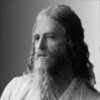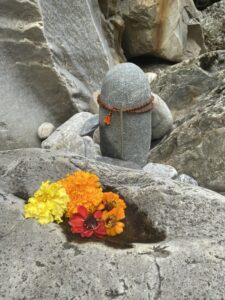There once was a teenage boy who was quite the rapscallion. He was in trouble at school, with the local authorities, and seemingly immune from social niceties. He came from a good family, and his parents tried everything to get him on the straight and narrow. They had him speak with his school principal, with a counselor, even with the local priest. No one had any impact on the lad and his behavior continued to be problematic.
Someone suggested to the parents they approach an old yogi who lived in a nearby forest. These decent people were beside themselves in worry over their son, so they were willing to try anything. They approached the yogi, and he agreed to stay in their home for three days.
The yogi’s first day in the home was uneventful. The boy ignored him, and he seemingly ignored the kid. Same with the second day. Same on the third day. Finally, it was time for the yogi to leave the house and return to his forest. The parents were disappointed at his lack of interaction with their son; they were distraught at the thought the situation would continue unimproved.
Since the yogi was old, he needed some help putting on his boots. The parents asked their son to help the man. The kid figured this guy was just about the only adult not hassling him, so he agreed. As the yogi sat in a chair, the boy kneeled down to tie the laces on his boots. Suddenly, he felt something warm and moist dropping on his head. He looked up and saw tears gently falling from the yogi’s eyes as he gazed at the boy with understanding and unconditional love. It is said that after being looked at with those eyes, the boy changed his ways.
Most of us consider our minds to be some sort of noun. It’s not a person or place, but it does seem like a thing. In the way we consider our arms and legs to be things that are part of us; similarly to we feel about our minds. We do a tremendous amount of thinking, but not as much journeying into the lands beyond the mind’s terrain,
In yoga, the purpose of life is to address the “atma vichara,” the “question of the soul.” This is: “Who am I?” We currently hold many answers to this question based on what we see in the mirror, what others have told us, and on social constructs. From the yogic perspective, these are limited answers to a profound question. A tree is more than a bunch of leaves.
Many people have a vague appreciation they are more than their physical body. In the West, we often use the term “soul” to describe the sense of being greater than our flesh and bones. Regardless of terminology, many do experience a certain transcendence to their corporal form and an inkling of the continuity of life after death.
From the yogic perspective, life not only continues beyond this lifetime, you existed prior to this lifetime. In truth, you are eternal; there was never a time when you did not exist. The reason why this isn’t recognized is not one of reality, it is of confusion. And, since confusion is a result of thought, we can state the inability to realize one’s eternal nature is a problem caused by tumult mind.
The solution is not a matter of correcting or improving the mind. Mind can only do what it can do. Like, your ears can only hear and your nose can only smell. Your mind can only think. What we are seeking, what will answer the question of the soul, is an experience beyond the mind.
Things can get a little tricky when speaking about what is beyond the mind because we use the mind to talk and understand. The mind works with language. There was a time in this lifetime when you were a baby and didn’t understand language. You developed this facility and now it seems natural. Language, however, is a learned skill and cannot help us to experience what is beyond its domain. So, let’s be alert to not using insights from consciousness transcendent to the mind to create intellectual structures that exist within the mind. All paradigms — no matter how intelligent, religious, or secure — are limited and prevent access to the unlimited. No thought constructs or belief systems can open the door to freedom.
Nasruddin was once seen by a friend on the street, crawling around on his hands and knees. “What are you doing, Nasruddin? The friend inquired.
Nasruddin said, “I’m looking for my lost keys.”
Wanting to be helpful, the friend got down and looked for the keys, too.
After some time unsuccessfully locating the keys, the friend asked, “Are you sure you lost the keys out here in the street?”
“Oh, no,” replied Nasruddin, “I lost them at home.”
The friend responded incredulously, “Then why are we looking for them out here?”
Nasruddin answered, “Because the light is better here.”
From a practical standpoint, let’s discuss how to find the soul. Not as an idea, but as a legitimate, solid as a rock experience. This is a two-fold process: going into the problem, and going towards the solution. I consider it similar to the way a tree drives its roots into the earth while at the same time striving towards the sun. In yoga, the path of undoing obstructions is called “jnana,” wisdom, and the path of seeking is called “bhakti,” devotion. These are likened to the two wings on the bird of truth, and the two nourishing breasts of the Divine Mother Goddess.
Wisdom is the process of going to the root of the problem: stop asking the question of the soul in the wrong places. The light may be better in the ol’ familiar places, but you can’t find the key there. For that matter, let’s jump to the conclusion of wisdom: Nothing in this wold can tell you who you are. Everything is changing, nothing is eternal. This is the teaching of impermanence. Our bodies change with time, obviously, as do our mental states. We will, hopefully, have experiences of great happiness and of deep sadness. This is as it should be, this is what makes life complete and whole. But, nothing in time can lead us to the eternal.
Lasting happiness, peace, joy, and safety cannot be found in any objects, experiences, or relationships. The paradox is that security is not found in structures of any sort; it is found in freedom.
From the time we were small children, we imprinted on people and situations. Our parents, elders and society taught us, and continue to teach in myriads of ways — both overt and covert — to believe we are mortal and vulnerable, at the prey of forces greater than ourselves in a vast external world. Those who teach this are not malevolent; they are sharing what they know, often with the best of intentions. They are, however, mistaken.
The nature of un-enlightenment is the belief in a personal story that begins with birth. Those who do not remember who they were before they were born cannot help us in our quest. This lack of remembrance is not a sin, but it is a lack of wisdom. Stop asking those without this wisdom to answer a question to which they do not have an answer.
When we stop asking other fallible people to support us on our quest for truth, we do not become distant or segregated. Rather, we become released from the co-dependance and dysfunction that is the hallmark of unenlightened relationships, however subconscious these dynamics may be. There is no need to seek answers or self-esteem from others when we are not reliant on them. Instead, we can communicate and love each other freely, from a place of empowerment where all parties have something to give and something to receive. This is sharing in its intimate sense.
The second aspect of our quest to answer the question of the soul is bhakti, devotion. Here, we look to the polestar of what we truly want — love, lasting happiness, contentment. Our tools are prayer, meditation, yoga and, above all else, yearning. On the path to the love, yearning does all the work.”
When our spiritual yearning takes precedence over superficial desires, the path of life becomes increasingly charming. It really is a matter of priorities. Skip the middleman; stop looking to externals to boost happiness, go straight to the happiness that can be found in your own heart. It’s not a question of worthiness, purity, or accomplishment, rather, it’s a matter of willingness. A willingness to accept the grace that is already present but which we push away.
This grace comes in the form of the teachings of the sages. What is the essence of these teachings? Give up what you don’t really want so you can enjoy what you do want. In other words, relinquish hurry, worry, fear, and doubt so that the light of love can shine on you. Take off your armor, and be naked and vulnerable before the healing rays of kindness.
Dive deeply into your own motivations. Explore why you think and do things. Be not ashamed at your own anger and selfishness. Don’t feel guilty about your shortcomings. Look at your foolishness gently while taking the hand of God in whatever form you understand divinity. Don’t let anything from the past keep you away. The door to the Kingdom of Heaven is unlocked and wide open; go ahead and walk through. You are invited. You are already worthy.
Own the operation of your mind and recognize anger and its allies as defense mechanisms. They are hungry ghosts, feeding on different subjects at various times. They are not reasons for lack of peace, they are excuses. We are all fallible and prone to foolishness. It’s nothing to be surprised about, nothing to hide from. It’s sort of like having a belly button; a natural part of the human condition.
The price of admission into the grace world is to give up that which causes suffering. Give it a try, you might enjoy being happy. If not, heck, you can always go back to being unhappy. That path is pretty well recognized.
Like our teenage friend at the beginning of this essay, we have a hard time changing our ways even if they are not helping us fulfill out potential. Growth and healing are possible, though, once we feel ourselves being seen through the eyes of unconditional love. To realize those eyes are gazing at us, we practice jnana and bhakti. As we open to love, our eyes become the loving eyes that see others. Then, the answer to the question of the soul is found to be in us, as us, and all around us as the universe. The price of admission into this divine world is to stop minding.




